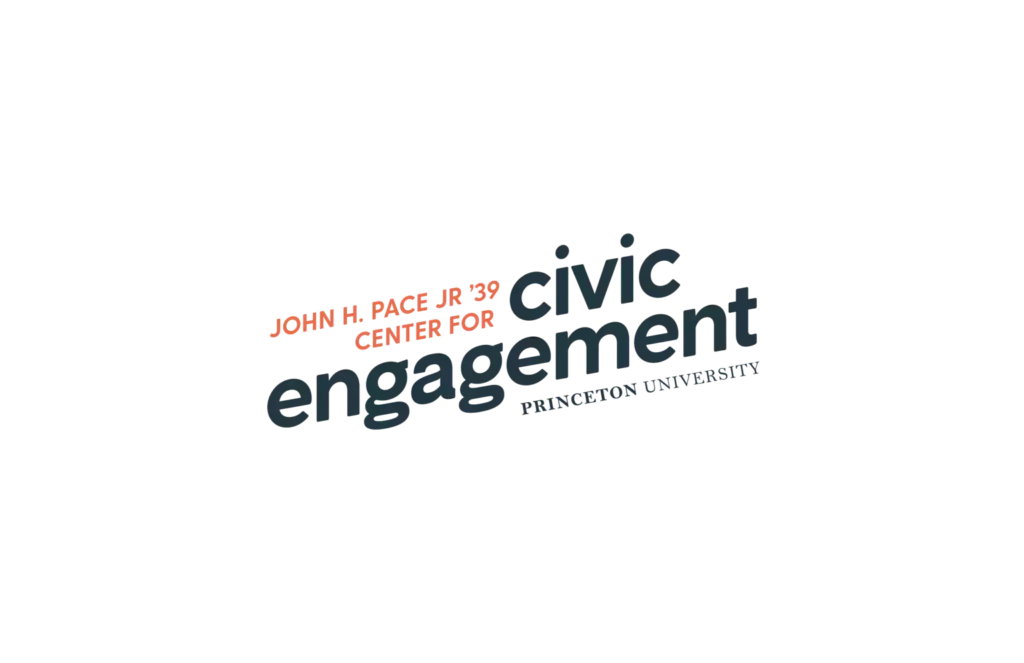
To extend our community outreach, the library partners with the many municipal, non-profit, and business organizations that make Princeton such an extraordinary town. This month, we spoke with Charlotte Collins, associate director and Gwen McNamara, communications specialist at the John H.Pace, Jr. ’39 Center for Civic Engagement at Princeton University (Pace Center for Civic Engagement).
The Pace Center works to make service and civic engagement a central part of the Princeton University student experience, and their guiding principles help to ensure that service work will be positive for all. One way that they do this is with their Field Guide to Service. This approach to service has been a guiding light to me as I work in the community and beyond.
The Pace Center and the library have many points of alignment in our centers of focus and look forward to opportunities to work together. We have co-sponsored programs in the past, most recently bringing journalist Maria Hinojosa to Princeton. Last summer, the library worked with one of the R.I.S.E. student interns.
How long has the Pace Center been in Princeton?
The John H. Pace, Jr. ’39 Center for Civic Engagement was founded in 2001 at Princeton University.
What is your primary area of focus?
The purpose of the Pace Center is to make service and civic engagement a central part of the Princeton University student experience so that undergraduate and graduate students can respond to the needs of the world in responsible ways. Ultimately, we envision that Princeton University students will make the world more equitable, creating access and opportunity for all people and communities to thrive.
How does your mission align with the library’s?
Just as the library seeks to connect people with ideas, information, technology, and resources to enrich people’s lives, the Pace Center seeks to connect Princeton University students and the wider community. Our mission is to prepare undergraduate and graduate students to serve well by making meaningful connections through learning, experience, and reflection.
With whom do you work most in the community?
The Pace Center works with a wide range of community organizations throughout the greater-Princeton area. Some of the groups that we collaborate with in Princeton include Cornerstone Community Kitchen, the Princeton Civil Rights Commission, Princeton Human Services, Princeton Mutual Aid, Princeton Nursery School, the Princeton Period Project, Princeton Public Schools, and the Princeton Senior Resource Center.
What is something that you do that people might not know about?
Many people might not know that service at Princeton University is so much more than
traditional volunteering. Across campus, service and civic engagement are defined broadly, encompassing everything from activism, community building, and mutual aid, to voting, social entrepreneurship, and community-engaged teaching and research. At the Pace Center we support students, staff, faculty, and alumni in learning how to prepare for service, how to engage effectively, and how to reflect and learn from their experiences (no matter what form of service they choose). In addition, given the impacts of the COVID-19 pandemic we continue to respond to the needs and challenges of our communities. For example, we have shifted workshops and experiences online and developed new efforts, like the Princeton Online Tutoring Network to support youth and families with online learning and Princeton RISE
(Recognizing Inequities and Standing for Equality), an anti-racist grant initiative.
Is there any project or event that you are particularly excited about at the moment?
The Pace Center is celebrating its 20th anniversary this year and we are proud of the work the University has done to make service and civic engagement a central part of the student experience. We will be sharing a new five-year strategic plan in the months ahead and hope to use this plan, along with the commemoration of our 20th, to highlight how connection to the greater community through service and civic engagement is an integral part of students’ education at Princeton.
Books we recommend:
In the past year, members of our staff team are reading these books. Each book was selected to broaden our collective understanding of race, racial justice, and the experiences of Black and Indigenous people at Princeton University and beyond.
